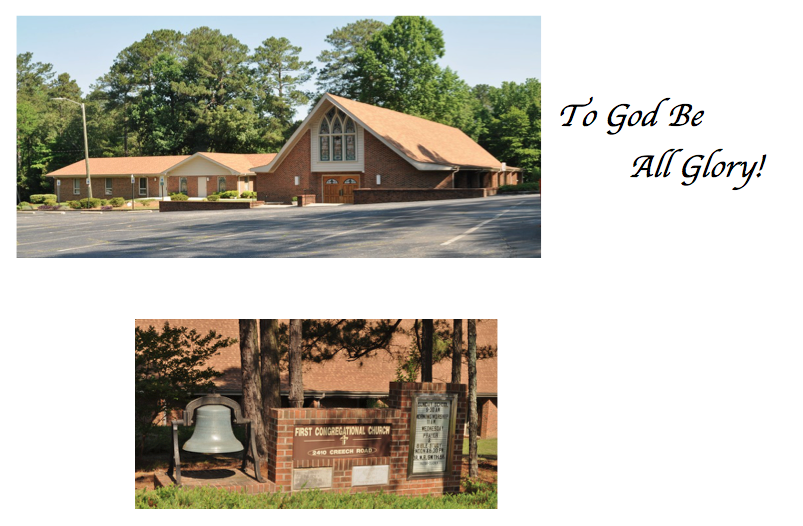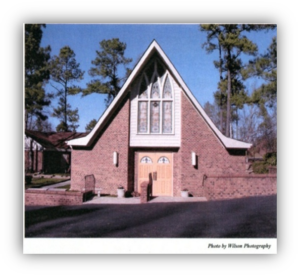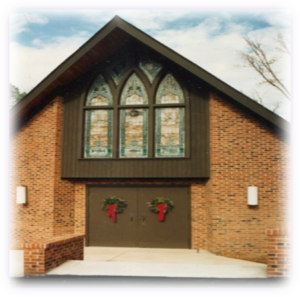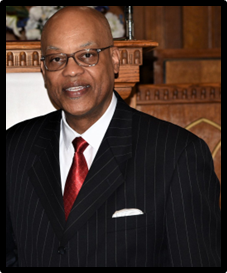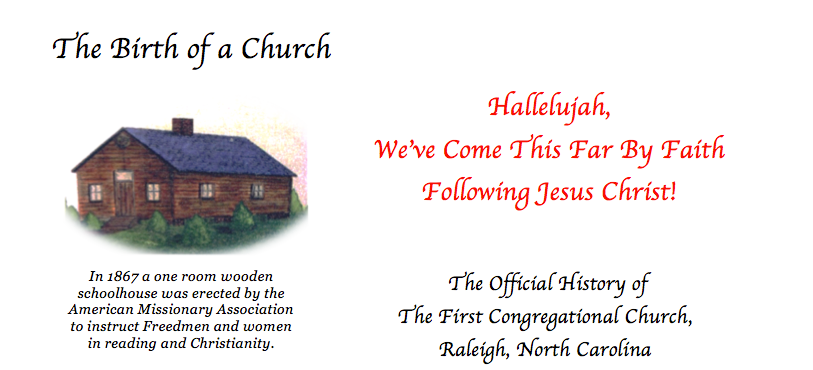
Any birth brings jubilation and joy along with uncertainties and doubts. There is no guarantee as to how long life will continue. The hope is that “a quality of life” will last for many decades. First Congregational Church of Raleigh, NC was “birthed” 155 years ago with no expectation that it would continue to be in existence for a century and a half+. God blessed this church with thirty-five dedicated original members, whose ancestry sits among us today. God provided anointed, visionary pastors who continued the original vision. They were outspoken and candid. When the pastors changed, the plan was picked up and it continued to move forward.
The American Missionary Association founded in 1846, was made up of whites, blacks, men, and women. The black men were ex-slaves, or they had been born free in the north, New York, Connecticut, or Massachusetts mainly. The white men were men of position with strong humanitarian feelings. The United Church of Christ and the Congregational Church financially supported this organization. In the mid 1860’s, the group began several schools in the South with the intention of helping educate freed slaves. Many of the Historically Black Colleges and Universities were begun through these efforts. The AMA began its humanitarian efforts in Mississippi, Louisiana, then, the Virginia and Washington, DC areas and finally expanded into North Carolina in 1867. After the Civil War, the south had been left in a state of confusion and disbelief. The freed slaves, as new citizens, were wandering in distrust and skepticism. They had few possessions, no education, and most had no skills; while others were very skilled in the use of some kinds of hand tools and of course plantation equipment. Although freed, these new citizens were in spiritual disarray.
The American Missionary Association met with black citizens in a one-room building facing South Street near Manley in Raleigh, NC. It was during this time that the Freedman’s School was established. Thus, began First Congregational Church’s connection to the American Missionary Association. The President of State University of North Carolina, Mr. F. P. Brewer, a man from the north, was named its leader. It preceded the establishment of Washington Grade School. This school became the first graded school for colored people, having seven grades. The one-room school building then became the church at the corner of South and Manley Streets. The structure was built of wood with the main entrance having steps leading from both South and Manley Streets.
The first principal of the school/church was Mrs. Esther P. Hayes, followed by Mr. E. A. Johnson, (who left an endowment to the church which still functions, and we receive money annually), and then Mr. John Branch, and Mr. J. L. Levister. The Reverend Fisk P. Brewer became the first official leader/pastor of the congregation as the church became more directed and organized. Some of the charter members of the church were Mr. Henry C. Jones, Mr. Henry Snipes, Mrs. Lucy Dunston, Mrs. Emma Banham, Mrs. Ida Mitchell, Mr. Thomas Mabry, Mrs. Lucy Ransom, Mrs. Scott, Mr. Holland Pope, Mr. Jordan Farrington, Mrs. Hanna Fouche, and Mrs. Lucy Fikes. Several of these charter members still have descendants connected to First Congregational Church today.
The church became a beacon of hope throughout the community known as The Fourth Ward. In 1877, Reverend George S. Smith became the first pastor of color. He led the little congregation to new heights of prominence in the City of Raleigh. Eventually, in 1882, the American Missionary Association, that still owned the buildings which included the church and a parsonage, transferred them to the City of Raleigh. At the end of Reverend Smith’s pastorate, Dr. Curtis White became pastor and served for about fifteen years. Following his tenure, the Reverends Jennings, H. E. King, T. M. Nixon, and F. B. Mallard served short but colorful terms as pastors of First Congregational Church. Just after the turn of the century, a new church building was built with gaslights and a furnace, which were non-typical inclusions for that time.
It was 1907 when the church obtained its first incorporated status, and officially established itself as an institution in the community of Raleigh, North Carolina. The community provided the church with large worshipping congregations. Aside from the regular members who walked to church from all over the city, it served residents from the student body of Shaw University and the State School for the Blind, which were then located at the corners of South Bloodworth and Lenoir Streets.
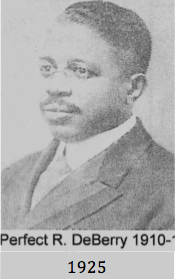 It was in 1910, with a membership of slightly more than thirty-five, a mortgaged parsonage, an old organ that
It was in 1910, with a membership of slightly more than thirty-five, a mortgaged parsonage, an old organ that 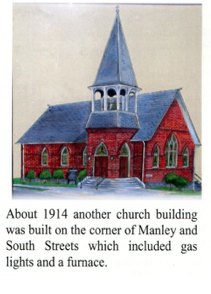 carried indebtedness, a dilapidated frame church building, dim gas lamps, and two old stoves that sat on either side of the church and were connected by huge unsightly pipes, that Reverend Perfect R. DeBerry became pastor, and served through 1925. Under his leadership, and with God’s anointing, First Congregational Church experienced thirteen years of expansive development. During Reverend DeBerry’s fifteen-year tenure, several programs and ministries were also implemented. He was a lover of young people, therefore ministries for the youth evolved; and Rev. DeBerry also worked diligently with a prison ministry. The first Boy Scouts of America troop for Negroes in the state was established at the church. Reverend DeBerry also spearheaded the establishment of the city’s first nursery school for black children and the first trade school. These accomplishments set the pace for many future ministries and programs that followed and still exist today.
carried indebtedness, a dilapidated frame church building, dim gas lamps, and two old stoves that sat on either side of the church and were connected by huge unsightly pipes, that Reverend Perfect R. DeBerry became pastor, and served through 1925. Under his leadership, and with God’s anointing, First Congregational Church experienced thirteen years of expansive development. During Reverend DeBerry’s fifteen-year tenure, several programs and ministries were also implemented. He was a lover of young people, therefore ministries for the youth evolved; and Rev. DeBerry also worked diligently with a prison ministry. The first Boy Scouts of America troop for Negroes in the state was established at the church. Reverend DeBerry also spearheaded the establishment of the city’s first nursery school for black children and the first trade school. These accomplishments set the pace for many future ministries and programs that followed and still exist today.
The Pauline Missionary Union was organized about this time. Its original goal was to provide spiritual and personal services where needed among church family, the community, the infirmed, the bereaved, and the oppressed. The Deacons and their wives worked together to meet spiritual needs of church members and the community. It was the duty of Deaconesses to prepare communion for the first Sunday services.
All the church officers were men and in addition to being pastor, the minister often was responsible for custodial chores. Through further reflection, we recall that our past church was much like our present one. Many of the auxiliaries were like today; The Senior Choir, now The Sanctuary Choir, The Tot Choir, over the years became the Youth Choir. As the youth became teenagers, The Young Disciples of Christ Choir was formed. The Gospel Choir, formed in the early 1950’s and is today the Cunningham-Ingram Gospel Choir. The Sunday School was very active then. The youth spiritual enrichment organizations were then known as the Christian Endeavor. Young adults from across the city met every Sunday evening for their activities. The church, which was  worth about $7,000 in 1910, was worth $40,000 by 1923. In 1918, the church declined the ongoing assistance of the American Missionary Association and became independent. In 1923, First Congregational Church gave $1,000 to missionary and benevolent causes, which started its tradition of monetary giving to those in need.
worth about $7,000 in 1910, was worth $40,000 by 1923. In 1918, the church declined the ongoing assistance of the American Missionary Association and became independent. In 1923, First Congregational Church gave $1,000 to missionary and benevolent causes, which started its tradition of monetary giving to those in need.
Reverend D. J. Flynn, a dynamic spiritual leader, served as pastor of FCC from 1926 through 1928. No pastor was appointed between 1929 and 1932. Reverend E. C. Lawrence became the next pastor and served for nineteen years (1932-1951). Among the outstanding accomplishments of his era, were the cancellation of the mortgage on the parsonage and acquisition of the deed to the church. The parsonage was equipped with a new heating system.
A brick edifice was erected with six rooms. A basement with a kitchen and space for a nursery were included. Two large furnaces were installed, electric lights were secured, and a pipe organ was purchased. Many of the early families made significant and lasting contributions to the church as the years passed. Donations included: pulpit furniture, bookcases, chairs, and tables, silver serving pieces, and communion supplies. The Willing Workers Club was immediately established for the purpose of supplying funds to supplement the church budget for fuel and kitchen supplies.
The Rev. Howard Cunningham became the eleventh Pastor of First Congregational (then) Christian Church in 1951.  The Congregational Christian Church merged with the Evangelical and Reformed Church and became The United Church of Christ. The church became First Congregational Church of the United Church of Christ. This occurred during Rev. Cunningham’s tenure. He served for twenty-one years and the church membership increased to 170 members.
The Congregational Christian Church merged with the Evangelical and Reformed Church and became The United Church of Christ. The church became First Congregational Church of the United Church of Christ. This occurred during Rev. Cunningham’s tenure. He served for twenty-one years and the church membership increased to 170 members.
He organized the Church Council to be the governing body of the church. This freed the pastor to be the spiritual leader of the church. First Congregational UCC had remained a beacon and a sanctuary to Raleigh’s Fourth Ward. Rev. Cunningham’s vision was to interact with even more of the Raleigh Community. He involved the church in many laudable endeavors; like working for racial justice, improvements for our race, and working with the General Synod of the Southern Conference (the governing body of the UCC). He began an integrated association with Community UCC on Wade Ave. The two churches enjoyed and shared worship services, Vacation Bible School, civil actions, and summer camps. The pastors and congregations exchanged pulpits and enjoyed special times during Race Relations Sunday, at Advent, and at Easter. They also executed joint activities with Davie Street Presbyterian Church and Pullen Memorial.
Rev. Cunningham followed the example of past pastors and involved the church in the community. During this time, the founder, Mrs. Euzelia Henderson organized The Lend-A-Hand Club (Later, “Club” became “Fellowship”). Its function was to be the pastor’s support group. Georgia Henderson organized The Women’s Usher Board in 1954, both groups had Rev. Cunningham’s blessing.
Many physical needs of the church were met during this time period (1953 through 1970): the organ was repaired, a new piano purchased, a heating system was installed, folding tables were secured, and the stain-glass windows were restored. A fence was placed around the playground for the nursery school, the interior and exterior of the church were painted, iron rails were installed
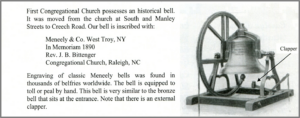
Each Sunday morning just before 9:00 am, Mr. Ernest Dudley (Min. Bessie Bukhay’s father) would ring the steeple bell to let the Fourth Ward know it was time for Sunday School.
at the church entrances. Concrete steps were placed at the back door of the church, and several repairs were made to the parsonage. A new floor was laid in the Sunday school room, the basement nursery was renovated, and a pastor’s study and the church office were added. Air-conditioning and a new heating system were also installed.

The Reverend Donald R. Ingram, Sr. began his pastorate at First Congregational Church in 1972. A visionary leader, Rev. Ingram’s mission was to preach and teach, the uncompromising Word of God for the edification of the body about Jesus Christ. Approximately three years into his pastorate, he became involved in a building program to move the location of the church edifice because of the City of Raleigh’s Urban Renewal of the Southside. It was through negotiations with The United Church of Christ Board for Homeland Ministries, that funds were acquired to purchase property on Creech Road in Southeast Raleigh. Because of the urban renewal project, the church at Manley and South Streets had to be demolished. The congregation arranged to worship at Gethsemane Seventh Day Adventist Church, then located on the corner of Person and Cabarrus Streets, until the new church was completed. The church broke ground for the new facilities on October 24, 1976. Many fixtures; stained glass windows, the pipe organ, curved pews, and pulpit furniture, to name a few, were relocated to the new church. The historic church bell was removed from the steeple on Manley Street and moved to the new church property on Creech Road.
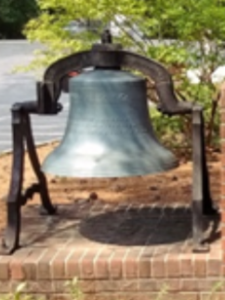
The bell, currently not in a steeple, sits at the entrance of the church property. It has been rung several times in its current location.
The first worship service was held in the new church structure on July 3, 1977. The church cleared its indebtedness in 1983, four years ahead of projection because of a forward-thinking Building Committee, and celebrated the mortgage burning in 1984. The church expanded with the addition of a multi-purpose room, additional bathrooms, a cry room, and a balcony. Additional church parking was added and a decision on how best to use the land purchased next to the front parking lot is still awaiting. Since the move, the organ has been restored, chimes and a trumpet for the organ have been added, a bus purchased, a van bought, the parking lot paved, and since then the cracks were resurfaced. A new mini bus was acquired. The church entered the millennium with color copiers, computers, color printers, new kitchen range, new office furniture, updated software and a five-and ten-ton air conditioner unit. We currently have six air conditioning units serving our facility.
About this time, Rev. Ingram began a radio program, “God is Still on The Throne”. The program continues to have thousands of faithful listeners every Saturday morning. The Deeper Life Bible Study & Outreach Ministries, advocating an in-depth study of God’s word, was begun by Rev. Dr. Lillie Jones, under Pastor Ingram’s leadership. The New Year’s Eve Experience was birthed by The Deeper Life Bible Study and Outreach Ministries and became a shared venture with area churches each December 31st. The FCC Drama Group, Joyous Praise Dance Ministry, God’s Ordinary People, the Puppet Ministry, the Prison Ministry, Seniors’ Focus, Youth Endeavors were all spawned by Deeper Life Outreach Ministry. Training or Teaching, Reaching, Educating, Equipping, Students (T.R.E.E.S.), was a monthly information and leadership session begun for teens, under the leadership of Dr. Jennifer Wilder and Rev. Paulette Kearney. Currently it is not functioning. Dr. Wilder has relocated to Florida and T.R.E.E.S. has not yet been restarted.
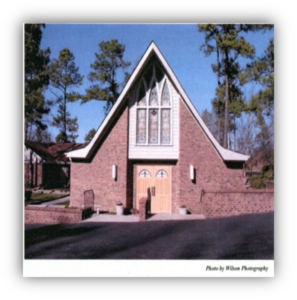
First Congregational Church since its onset has been a place of educational learning and enlightenment.
In addition to a place of worship and spiritual growth, the church serves as a place of educational enlightenment and reinforcement through emphasis on scholarship funding for its members desiring to attend institutions of higher learning. A Tutorial Program was begun in 1979 and provided tutoring for students in primary through high school for twenty-five years.
The millennium has established confirmation for an Annual Revival, a Health Ministry, the Women’s Fellowship, and the creation of an intra-structure for the future that includes strategic planning sessions, a technology committee, a finance committee, a Planning Committee for Future Ministry Activities, and a committee to update the church’s by-laws. All have been accomplished. The church’s Male Chorus was the first of the choirs to produce, and successfully market, a Christian CD of their favorite songs. The Senior Choir has changed its name to The Sanctuary Choir. The church has launched its website, www.fccraleigh.org, and a Facebook page, which are regularly updated.
First Congregational Church in December 2004, unanimously voted to withdraw from the United Church of Christ Denomination, and to continue as an independent, freestanding church, still serving the needs of God’s people. It remained this way until it became associated with the Raleigh Baptist Association in 2019. FCC withdrew from the RBA on August 3, 2022.
The First Congregational Church has a group of associate ministers who are truly dedicated; Rev. Delores Hunter, Rev. Paulette Kearney, Rev. Alice Omoti, and Minister Bessie Bukhay (is also the church’s administrative assistant) providing tremendous support, offering reassurance, explanations, and clarifications in furthering the gospel of Jesus Christ to the community of faith. Several additional individuals have answered God’s call to enter the ministry. The response to that call has aided in carrying God’s Word and its intent to His people. From the early 1970’s through 2020, more than 37 individuals have answered God’s call to ministry from First Congregational Church. FCC currently has five Associate Ministers who take active rolls in our day-to-day activities: Rev. Paulette Kearney, Minister Bessie Jean Bukhay, Rev. Alice Omoti, and most recently, Rev. Carolyn Ingram. Rev. Delores Hunter is currently on a medical leave of absence.
Pastor Donald R. Ingram, Sr. retired as Pastor of FCC on Sunday, July 31, 2014. His 42 years of dedication to this church were remarkable. A Pastoral Search Committee was formed and worked for thirty months on the difficult task of replacing our shepherd. The church was in a continuous prayer mode as the committee searched, prayed, and interviewed candidates, constantly seeking
God’s direction. God answered our prayers by sending Rev. Dr. Michael R. Smith, Sr. to us. Dr. Smith answered God’s call and on January 1, 2017, and became the thirteenth Pastor of First Congregational Church. The church seemingly has not skipped a beat. It has undergone several renovations recently, a stove and refrigerator were purchased, it has had the first confirmation class and baptism of the year and installed our new Pastor on Sunday afternoon April 2, 2017. Shortly thereafter, Rev. Donald R. Ingram, Sr. became the Pastor Emeritus of First Congregational Church. The church has remodeled the lobby, and the Charlotte H. Greene Fellowship Hall.
There is now a Spiritual Canopy under which all of our teaching ministries fall. The organizational structure, implemented by Rev. Dr. Smith, is: THE SCHOOL OF CHRISTIAN WORLDVIEW ROMANS 12:1-2.
The FCC School of Christian Worldview includes all teaching ministries of the Church. The goal of all our teaching efforts is to help FCC disciples to keep growing and to live by a Christian Worldview. A Christian Worldview is a perspective of living that sees the world through the eyes of Holy Scripture. All educational and teaching ministries are designed to promote a Christian worldview to all disciples of FCC. The School of Christian Worldview includes the following ministries:
- Disciple Talk Prayer/Bible Study – Wednesdays @ Noon and 6:30 pm
- Great Commission Sunday School – Sundays @ 9:30 am
- Kingdom Leadership Development Training – 1st Saturdays @ 9:00 am
- Fulfilling My Dreams Youth & Young Adult Training – Upon Request
- Disciple Talk Outreach Bible Study – Thursdays @ 6:30 pm
- New Member Orientation Training – Sundays @ 9:30 am
- FCC Family and Marriage Ministry – Upon Request
First Congregational Church continues to exist and thrive on Believing God’s Word, Living God’s Word, and Trusting God’s Word. We praise God for the 155 years that he has blessed us. We will celebrate our anniversary with grateful hearts. The theme for the 155th Anniversary is, “A Foundation Built on Faith: Yesterday, Today, and Forevermore.” God continues to bless First Congregational Church and keeps us a strong house of worship for His Praise and His Glory, and we will always be eternally grateful and immensely satisfied with our blessed past. Rev. Dr. Michael R. Smith, Sr. submitted his resignation effective December 31, 2022. It was accepted.
We are following God’s Lead for our next Pastor with prayer and fasting.
New Pastor Thoughts: Isaiah 8:17a Lamentations 3:25,26 Hosea 12:6
The 2023 Church Theme: Pressing Forward in Faith and Grace
